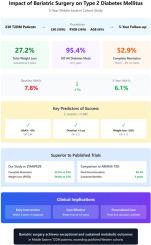Impact of bariatric surgery on Type 2 Diabetes Mellitus: A comprehensive 5-year analysis of weight loss, glycemic control, and cardiometabolic outcomes
Q2 Medicine
引用次数: 0
Abstract
Background
Bariatric surgery has emerged as a potent intervention for patients with obesity and Type 2 Diabetes Mellitus (T2DM).
Objectives
To assess 5-year outcomes of bariatric surgery in Middle Eastern patients with T2DM and develop a predictive model for diabetes remission.
Setting
Tertiary care center, United Arab Emirates.
Methods
We conducted a retrospective cohort study of 238 T2DM patients (161 females, 67.6 %; mean age 46.8 ± 11.6 years) who underwent bariatric surgery from 2013 to 2019. Procedures included laparoscopic sleeve gastrectomy (LSG; n = 138, 58.0 %), Roux-en-Y gastric bypass (RYGB; n = 85, 35.7 %), and adjustable gastric banding (AGB; n = 15; 6.3 %). Clinical, biochemical and cardiometabolic parameters were followed for 5 years. Multivariate logistic regression analysis identified independent predictors of diabetes remission.
Results
Sustained total weight loss of 26.2 %, 29.2 %, and 27.2 % was achieved at 1, 3, and 5 years respectively. HbA1c decreased from 7.8 ± 1.5 % to 6.1 ± 1.0 % at 5 years (p < 0.001). By 5 years, 95.4 % of patients discontinued diabetes medications. Complete diabetes remission (HbA1c <6.0 % without medications) was achieved in 52.9 %, exceeding rates typically reported in randomized controlled trials of bariatric surgery (23–29 %) in Western populations. Multivariate analysis revealed baseline HbA1c <8 % (OR 2.84, 95 % CI 1.52–5.31, p = 0.001), diabetes duration <5 years (OR 3.21, 95 % CI 1.78–5.79, p < 0.001), and weight loss >20 % at 1 year (OR 4.15, 95 % CI 2.23–7.72, p < 0.001) as independent predictors of sustained remission (C-statistic = 0.842).
Conclusions
Bariatric surgery provides sustained improvements in weight loss and glycemic control in Middle Eastern T2DM patients over 5 years. The identification of key predictors enables better patient selection and personalized treatment strategies.

减肥手术对2型糖尿病的影响:一项关于体重减轻、血糖控制和心脏代谢结果的5年综合分析
背景:减肥手术已成为肥胖和2型糖尿病(T2DM)患者的有效干预措施。目的评估中东T2DM患者减肥手术的5年预后,并建立糖尿病缓解的预测模型。三级保健中心,阿联酋。方法对2013 - 2019年接受减肥手术的238例T2DM患者(女性161例,67.6%,平均年龄46.8±11.6岁)进行回顾性队列研究。手术包括腹腔镜袖胃切除术(LSG, n = 138, 58.0%)、Roux-en-Y胃旁路术(RYGB, n = 85, 35.7%)和可调节胃束带(AGB, n = 15, 6.3%)。临床、生化及心脏代谢指标随访5年。多因素logistic回归分析确定了糖尿病缓解的独立预测因素。结果1年、3年和5年的持续总体重减轻率分别为26.2%、29.2%和27.2%。5年后,HbA1c从7.8±1.5%降至6.1±1.0% (p < 0.001)。5年后,95.4%的患者停止了糖尿病药物治疗。52.9%的患者实现了糖尿病完全缓解(无药物治疗的HbA1c和lt达到6.0%),超过了西方人群中减肥手术随机对照试验中通常报道的比率(23 - 29%)。多因素分析显示,基线HbA1c <; 8% (OR 2.84, 95% CI 1.52-5.31, p = 0.001)、糖尿病病程<;5年(OR 3.21, 95% CI 1.78-5.79, p < 0.001)和1年体重减轻>; 20% (OR 4.15, 95% CI 2.23-7.72, p < 0.001)是持续缓解的独立预测因子(C-statistic = 0.842)。结论:在中东T2DM患者中,减肥手术提供了5年以上体重减轻和血糖控制的持续改善。关键预测因素的识别使更好的患者选择和个性化的治疗策略。
本文章由计算机程序翻译,如有差异,请以英文原文为准。
求助全文
约1分钟内获得全文
求助全文
来源期刊

Obesity Medicine
Medicine-Public Health, Environmental and Occupational Health
CiteScore
5.50
自引率
0.00%
发文量
74
审稿时长
40 days
期刊介绍:
The official journal of the Shanghai Diabetes Institute Obesity is a disease of increasing global prevalence with serious effects on both the individual and society. Obesity Medicine focusses on health and disease, relating to the very broad spectrum of research in and impacting on humans. It is an interdisciplinary journal that addresses mechanisms of disease, epidemiology and co-morbidities. Obesity Medicine encompasses medical, societal, socioeconomic as well as preventive aspects of obesity and is aimed at researchers, practitioners and educators alike.
 求助内容:
求助内容: 应助结果提醒方式:
应助结果提醒方式:


